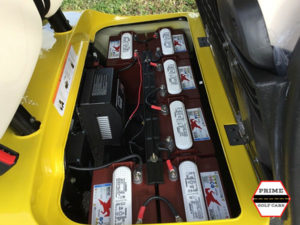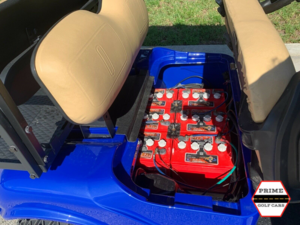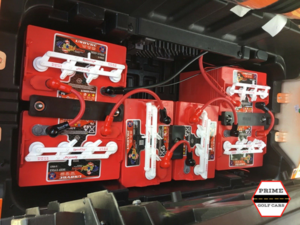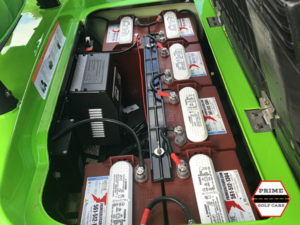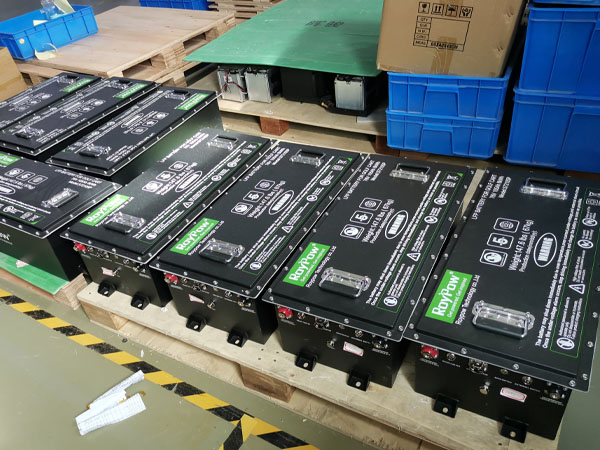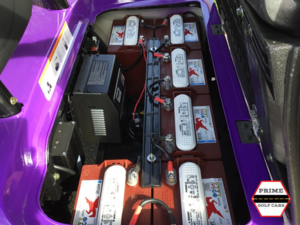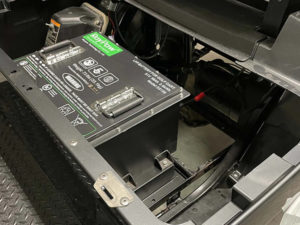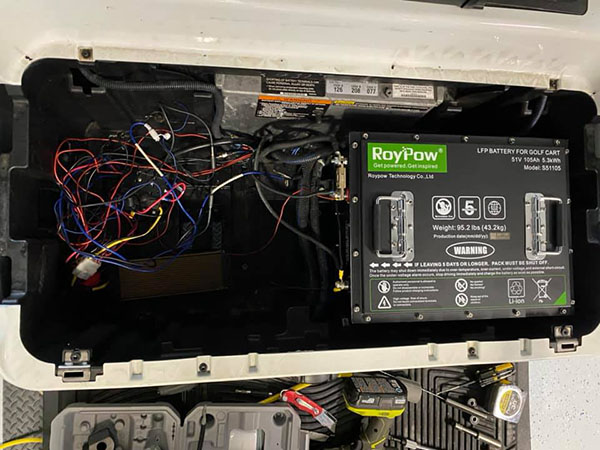One of our best-selling golf cart lithium battery is the RoyPow lithium battery kit, which comes with everything you need to easily convert your golf cart from a lead-acid battery system to a lithium battery. Switching from lead-acid to lithium comes with several benefits, including no battery maintenance – such as waterfilling or terminal cleaning/tightening -, a much longer life, a much longer driving range, a much faster charging time, much less weight on the golf cart – up to 400 pounds less, depending on the kind of lithium battery -, and many more charging cycles. Lead-acid batteries only last around 1 to 2 years while lithium batteries can last up to 10 years, and our RoyPow batteries can recharge completely in just 5 hours, while lead-acid batteries can take up to 18 hours to fully recharge if they are very low.
| RoyPow 100AH Lithium Battery | RoyPow 160AH Lithium Battery |
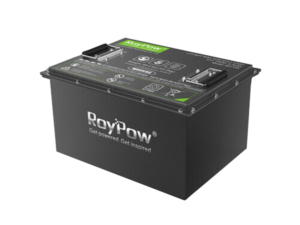 |
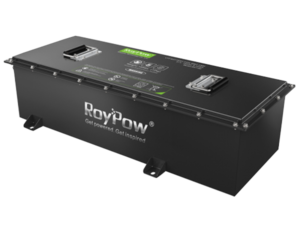 |
We just launched a website – RoyPow Batteries – for our RoyPow golf cart lithium battery kits, which includes the 56AH, 100AH, and 160AH. The 56AH battery can travel approximately 30-35 miles on a charge, while the 100AH can travel about 60-65 miles on a charge, and the 160AH can travel about 90-95 miles on a charge. A RoyPow lithium battery has multiple built-in safety measures, such as fire detection systems, water spray systems, flammable volatile monitoring and alarms, battery box warnings and protections, battery operating situation monitoring, and anti-collision, along with many other active safety systems. You can learn more about each type of battery by visiting and viewing the different pages for each battery.
Below are some more of the golf cart lithium battery brands we have available. To order, visit Prime Cart Parts or contact us using our contact form.
Allied Golf Cart Lithium Battery
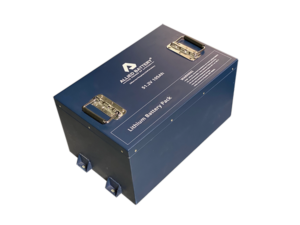 Unlike standard lead-acid golf cart batteries, only one of the Allied lithium battery is needed for the golf cart. When removing a system of lead-acid batteries – often 6 to 8 70-pound batteries – and replacing them with a single, 71 pound Allied battery, between approximately 300 and 400 pounds of weight is removed from the golf cart, greatly improving performance. The Allied battery is also easy to install, and is referred to as “drop-in ready”.
Unlike standard lead-acid golf cart batteries, only one of the Allied lithium battery is needed for the golf cart. When removing a system of lead-acid batteries – often 6 to 8 70-pound batteries – and replacing them with a single, 71 pound Allied battery, between approximately 300 and 400 pounds of weight is removed from the golf cart, greatly improving performance. The Allied battery is also easy to install, and is referred to as “drop-in ready”.
The battery is great for long-term storage, as it has its own storage mode. To store correctly: fully charge the battery, unplug charger, flip the golf cart switch to tow mode, and press the power button on the side of the Allied battery. This puts it into storage mode – great for snowbirds leaving their carts in storage. The Allied battery also works with upgraded motors and controllers. From fleet to performance, Allied has the right battery to run your golf cart or ATV vehicle perfectly.
Learn more about the Allied lithium battery by reading our pages about the 65AH battery and 105AH battery.
ProVolt Lithium Battery
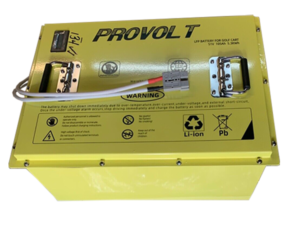 The ProVolt lithium battery is designed to easily replace a system of lead-acid batteries in a 48V golf cart, and offers several benefits, including no maintenance, no harmful chemical fumes, a much longer range with a significantly shorter charging time, and a much longer life. Most standard golf cart batteries only last 1 to 2 years, with around 500 charging cycles, while a ProVolt battery can be charged approximately 3,500 times over a period of about 10 years. Each battery is put through strict quality control and testing, which includes using rigorous vibration tests developed by Volkswagon engineers.
The ProVolt lithium battery is designed to easily replace a system of lead-acid batteries in a 48V golf cart, and offers several benefits, including no maintenance, no harmful chemical fumes, a much longer range with a significantly shorter charging time, and a much longer life. Most standard golf cart batteries only last 1 to 2 years, with around 500 charging cycles, while a ProVolt battery can be charged approximately 3,500 times over a period of about 10 years. Each battery is put through strict quality control and testing, which includes using rigorous vibration tests developed by Volkswagon engineers.
ProVolt batteries are available in 105AH, best for 4 passenger golf carts, and 176AH, recommended for 6 passenger golf carts. Our ProVolt battery kit comes with everything necessary to convert a 48V golf cart, including the battery, charger, mounting brackets, and adaptor. The ProVolt charger is automatic and is designed to shut off when charging is complete, and charges at a rate of 25amp. A ProVolt lithium battery is also significantly lighter than a system of lead-acid batteries, weighing under 200 pounds. Because only one is needed as opposed to multiple 6V, 8V, or 12V lead-acid batteries, the less weight on the golf cart improves performance, speed, and can even increase the overall life of the golf cart.
Read more about ProVolt lithium batteries by reading our pages on the 105AH battery and the 176AH battery.
50AH Golf Cart Lithium Battery
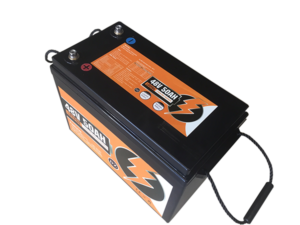 Our new universal 48V 50AH golf cart lithium battery kit fits in all types of golf cart, including the most popular brands EZGO, Club Car, Yamaha, etc. This kit includes everything needed to convert a 48V golf cart from a lead-acid battery system to a lithium battery – the battery, charger, adaptor, and mounting brackets for your specific golf cart. Features include up to 3,000 charging cycles, fast recharging time, much longer driving range, and much less weight than lead-acid batteries. Our 50AH lithium battery weighs just 40.3 pounds.
Our new universal 48V 50AH golf cart lithium battery kit fits in all types of golf cart, including the most popular brands EZGO, Club Car, Yamaha, etc. This kit includes everything needed to convert a 48V golf cart from a lead-acid battery system to a lithium battery – the battery, charger, adaptor, and mounting brackets for your specific golf cart. Features include up to 3,000 charging cycles, fast recharging time, much longer driving range, and much less weight than lead-acid batteries. Our 50AH lithium battery weighs just 40.3 pounds.
Read about the 50AH battery here.
RoyPow Batteries
Check out our new website RoyPow Batteries for more information on RoyPow lithium batteries, and use our contact form for any questions you may have.
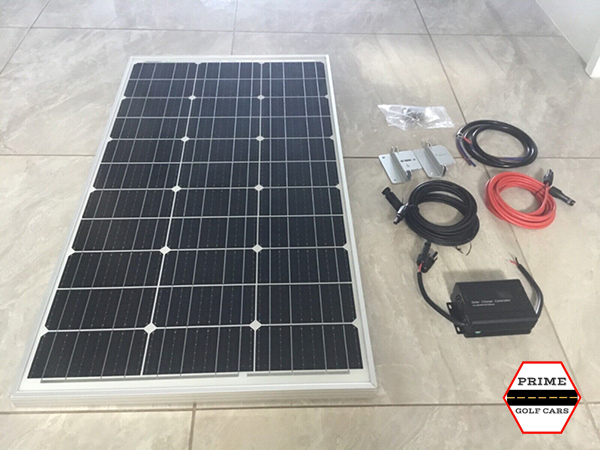
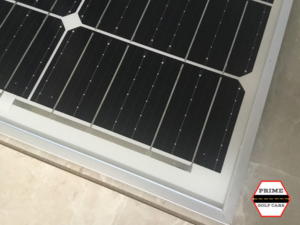
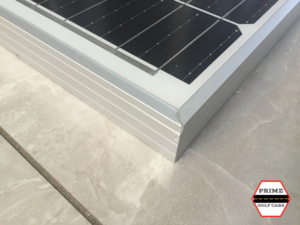
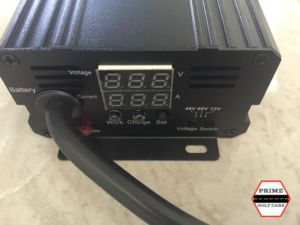
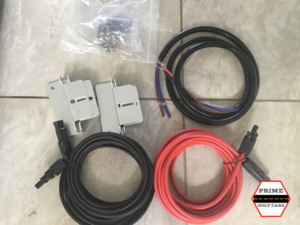
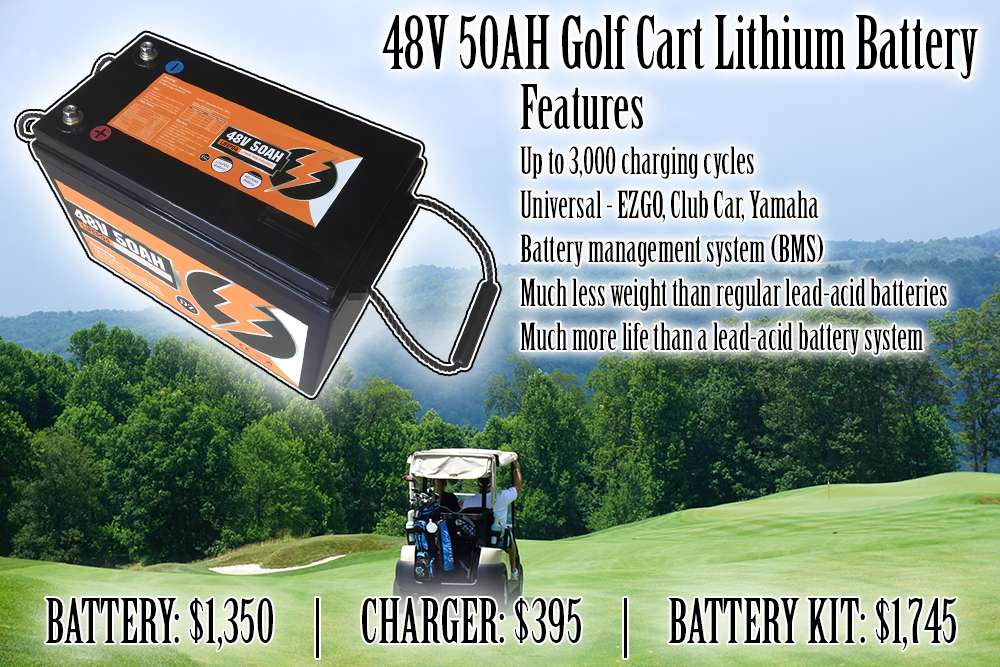
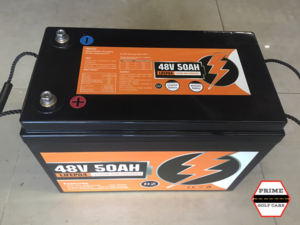 Fully charged 48V 50ah LiFePO4 Lithium Battery can support 2560Wh energy for your appliances. It weighs only 40.3 lbs, only 1/3 of the weight of a 12V 100Ah AGM SLA Battery. It makes installation and movement more easier.
Fully charged 48V 50ah LiFePO4 Lithium Battery can support 2560Wh energy for your appliances. It weighs only 40.3 lbs, only 1/3 of the weight of a 12V 100Ah AGM SLA Battery. It makes installation and movement more easier.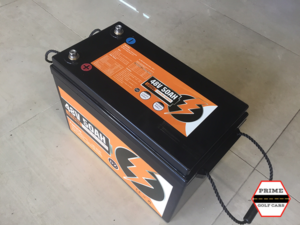 Full battery kit – $1,745
Full battery kit – $1,745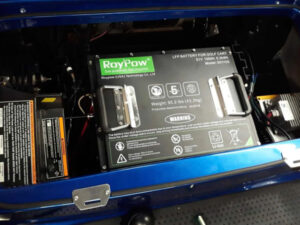
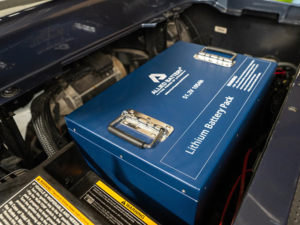
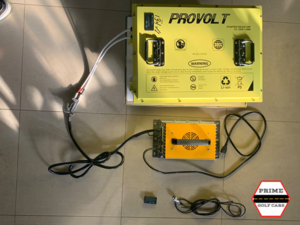
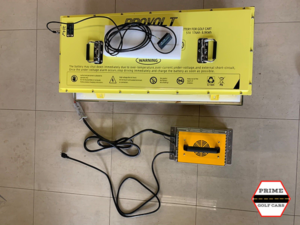
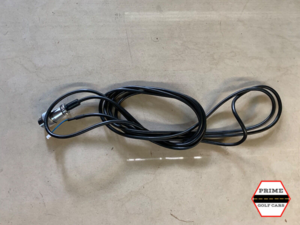
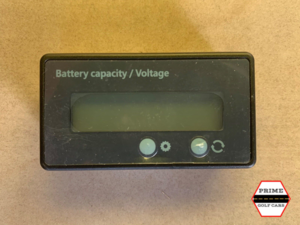
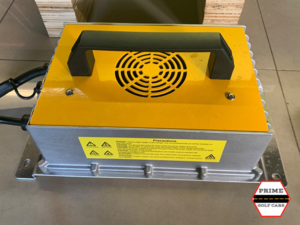
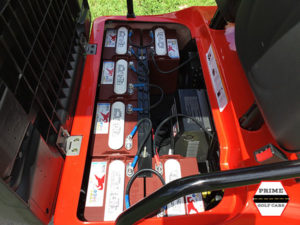
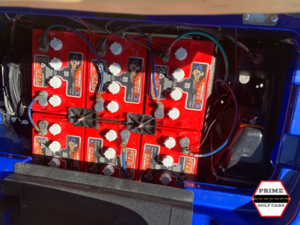
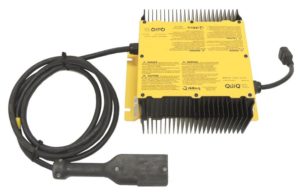 Most golf cart chargers use a 3-stage charging algorithm, consisting of a bulk charge stage, absorption charge stage, and finish charge stage. This algorithm determines how much power returns to the battery at various intervals, in order to make sure it is not undercharged or overcharged. During the bulk charge stage, about 80% of the discharged battery power will be recharged, usually taking around 4-8 hours depending on how low the battery charge was. The second stage, the absorption charge stage, the charge current slowly decreases until the 100% of the discharged battery power is recharged – however, this does not mean the battery is fully recharged. The final stage, the finish charge stage, slightly and safely overcharges the battery to account for efficiency losses. When using the right size charger, the battery is safely overcharged without damage.
Most golf cart chargers use a 3-stage charging algorithm, consisting of a bulk charge stage, absorption charge stage, and finish charge stage. This algorithm determines how much power returns to the battery at various intervals, in order to make sure it is not undercharged or overcharged. During the bulk charge stage, about 80% of the discharged battery power will be recharged, usually taking around 4-8 hours depending on how low the battery charge was. The second stage, the absorption charge stage, the charge current slowly decreases until the 100% of the discharged battery power is recharged – however, this does not mean the battery is fully recharged. The final stage, the finish charge stage, slightly and safely overcharges the battery to account for efficiency losses. When using the right size charger, the battery is safely overcharged without damage.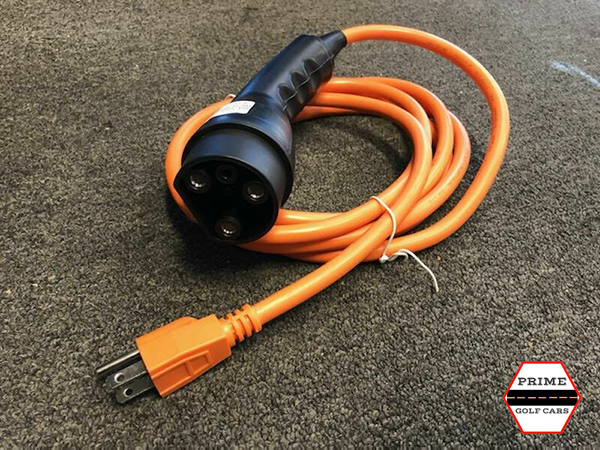 When charging lead-acid golf cart batteries, it’s important to do it in a well-ventilated area. One of our recommendations is also to lift up the seat that covers the batteries – in 4 passenger carts, they are most often under the front 2 seats, and 6 passenger carts mostly have them under the middle row of seats – either before or directly after plugging in the charger. This is because when a lead-acid battery system is plugged in, as it begins charging, it can release hazardous fumes from the chemicals inside the batteries. Build-up of these fumes under the seats can be dangerous, so to avoid this, either leave the seat up as the batteries charge, or lift the seat and allow any possible fumes to clear out and ventilate before putting the seat back down.
When charging lead-acid golf cart batteries, it’s important to do it in a well-ventilated area. One of our recommendations is also to lift up the seat that covers the batteries – in 4 passenger carts, they are most often under the front 2 seats, and 6 passenger carts mostly have them under the middle row of seats – either before or directly after plugging in the charger. This is because when a lead-acid battery system is plugged in, as it begins charging, it can release hazardous fumes from the chemicals inside the batteries. Build-up of these fumes under the seats can be dangerous, so to avoid this, either leave the seat up as the batteries charge, or lift the seat and allow any possible fumes to clear out and ventilate before putting the seat back down.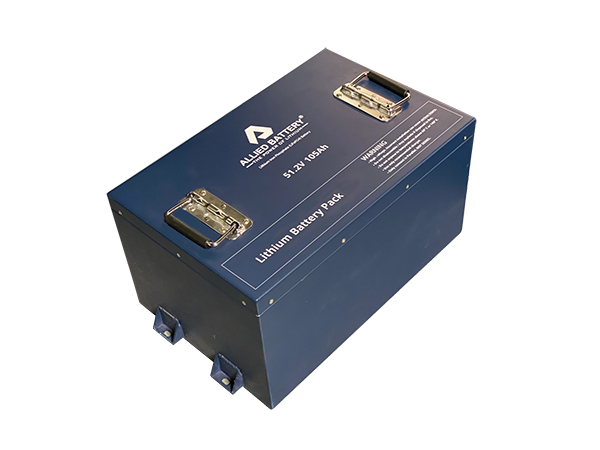
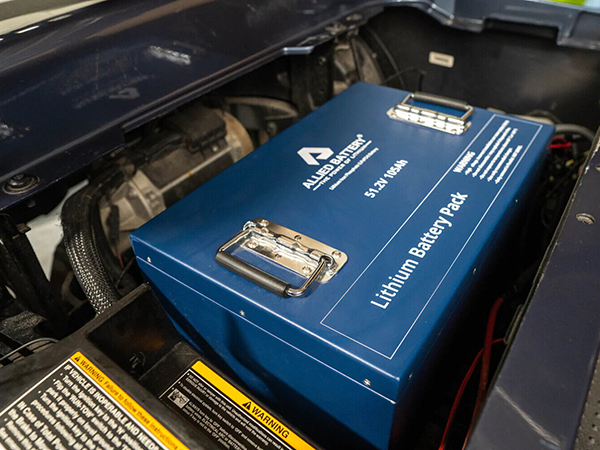
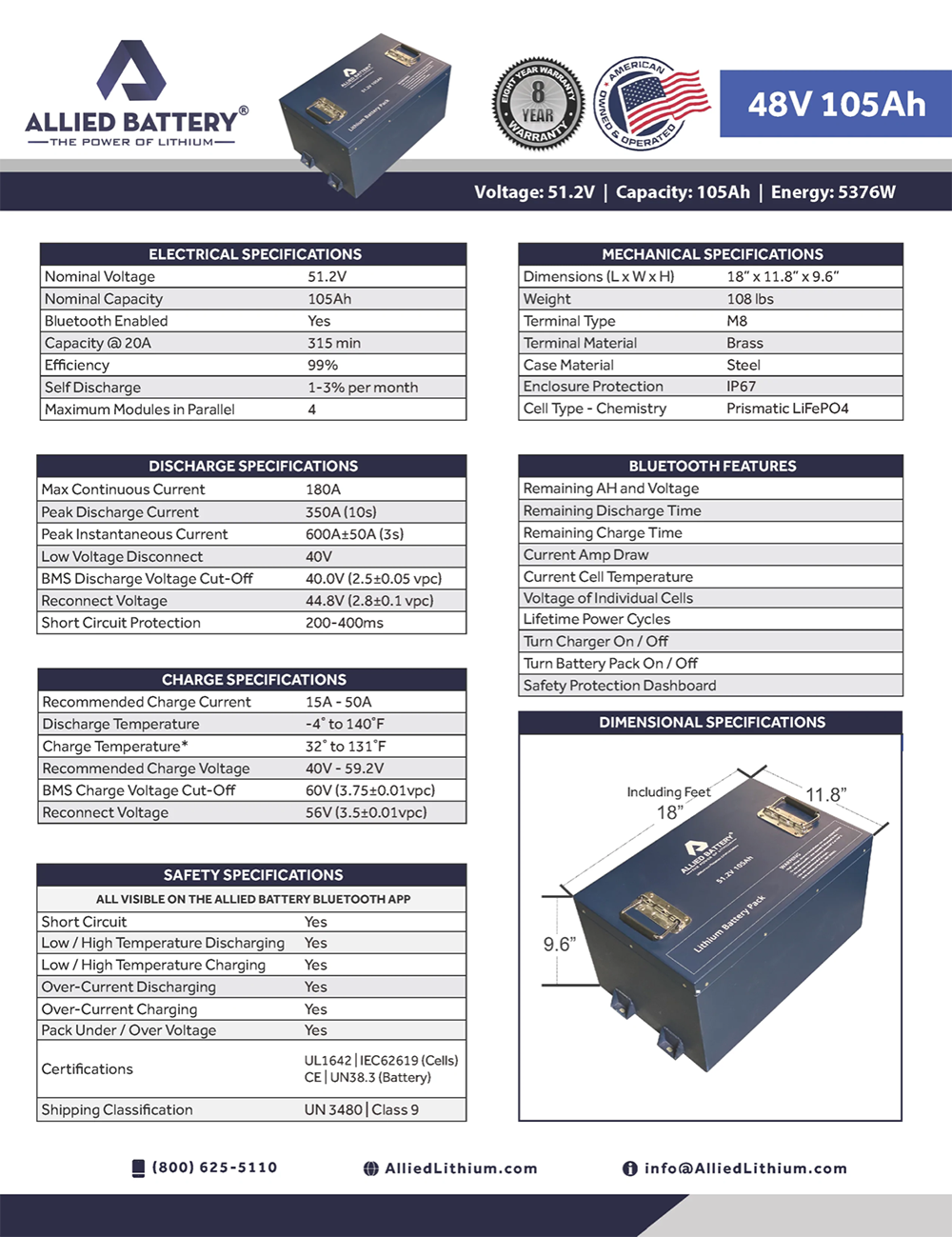
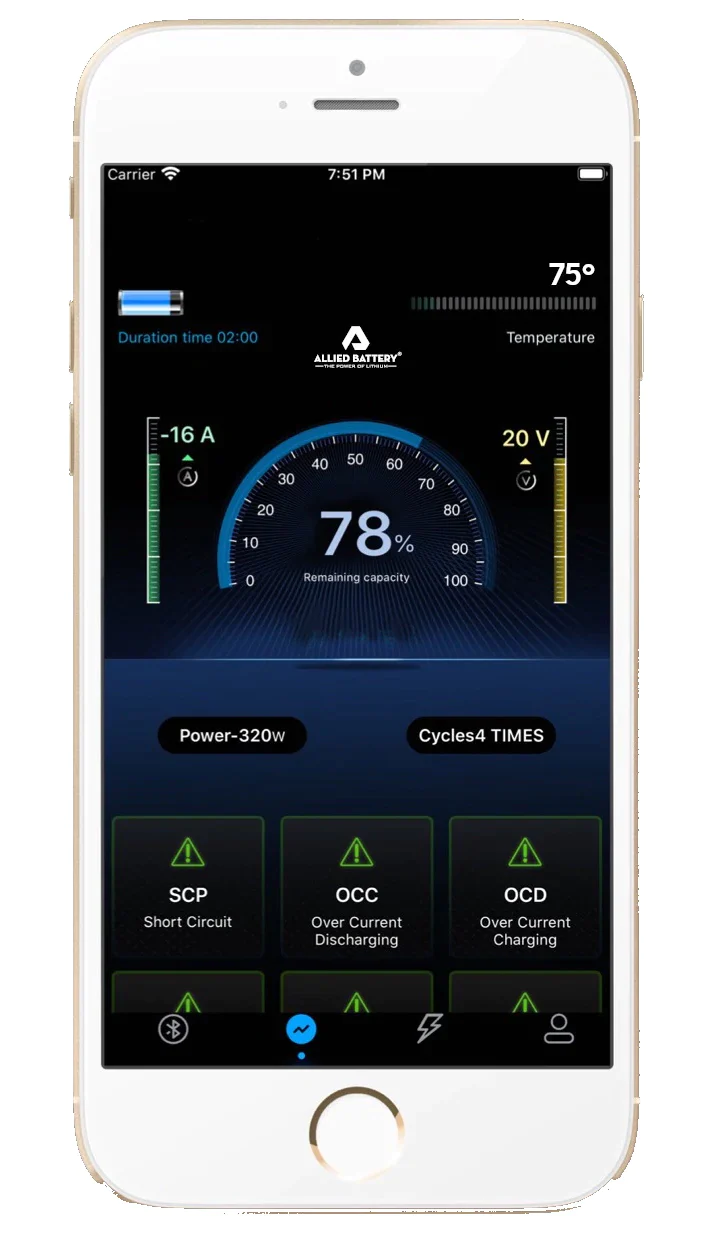
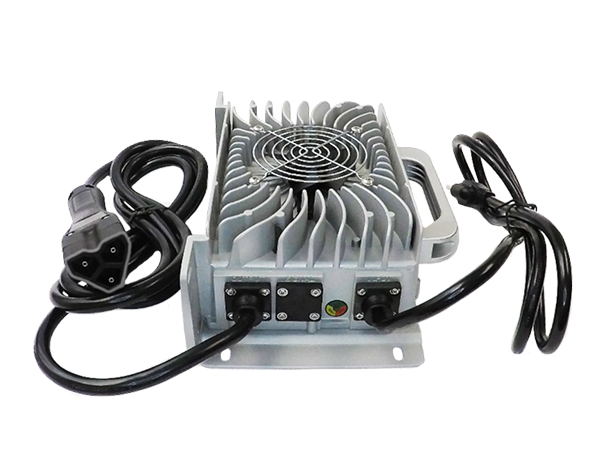
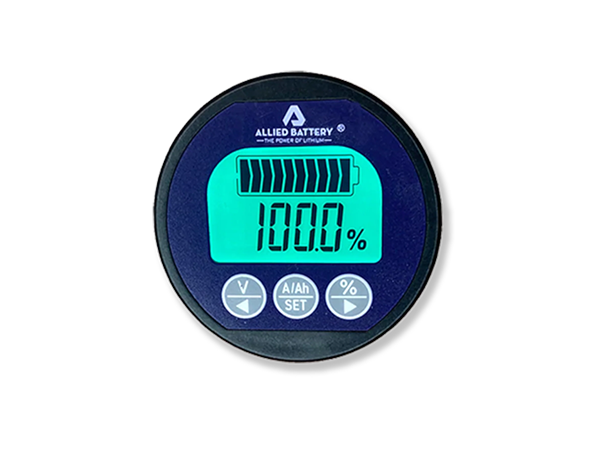
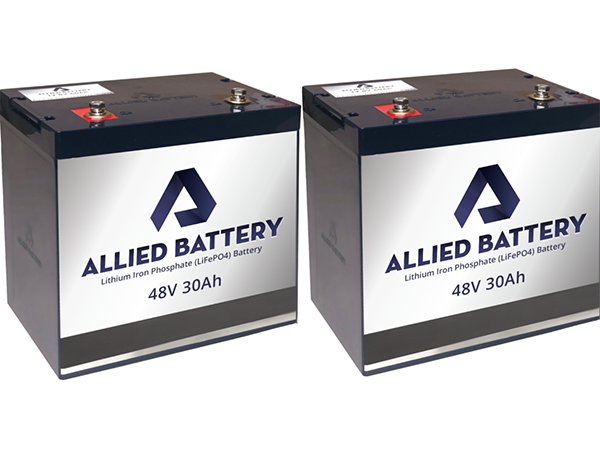
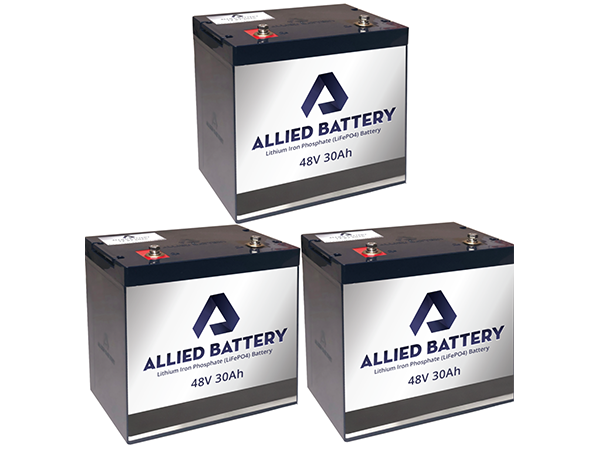
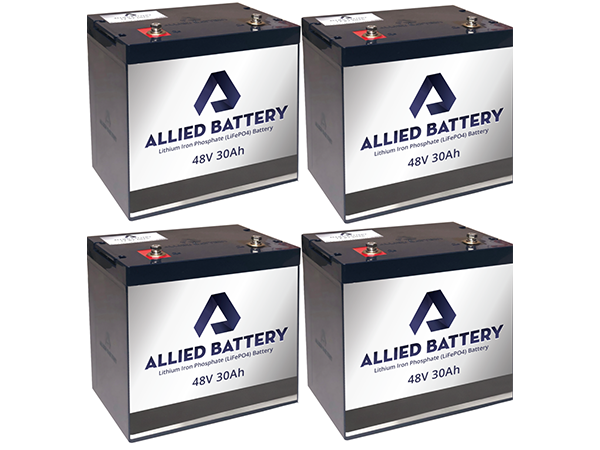
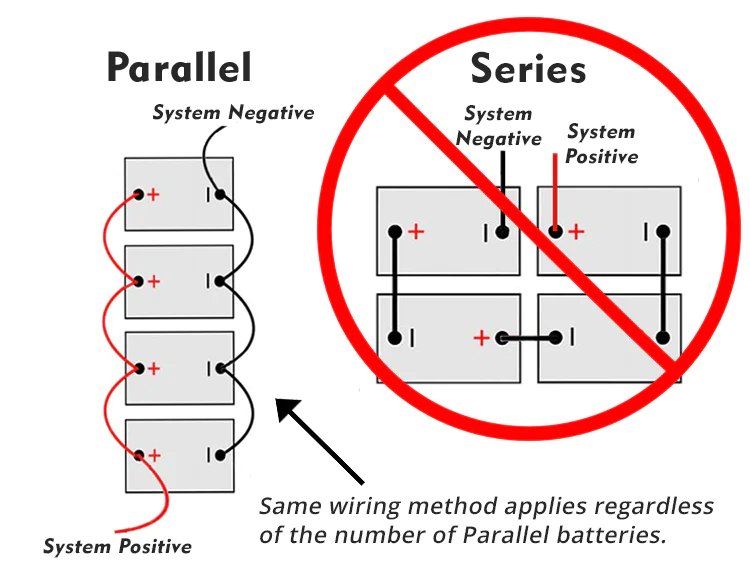
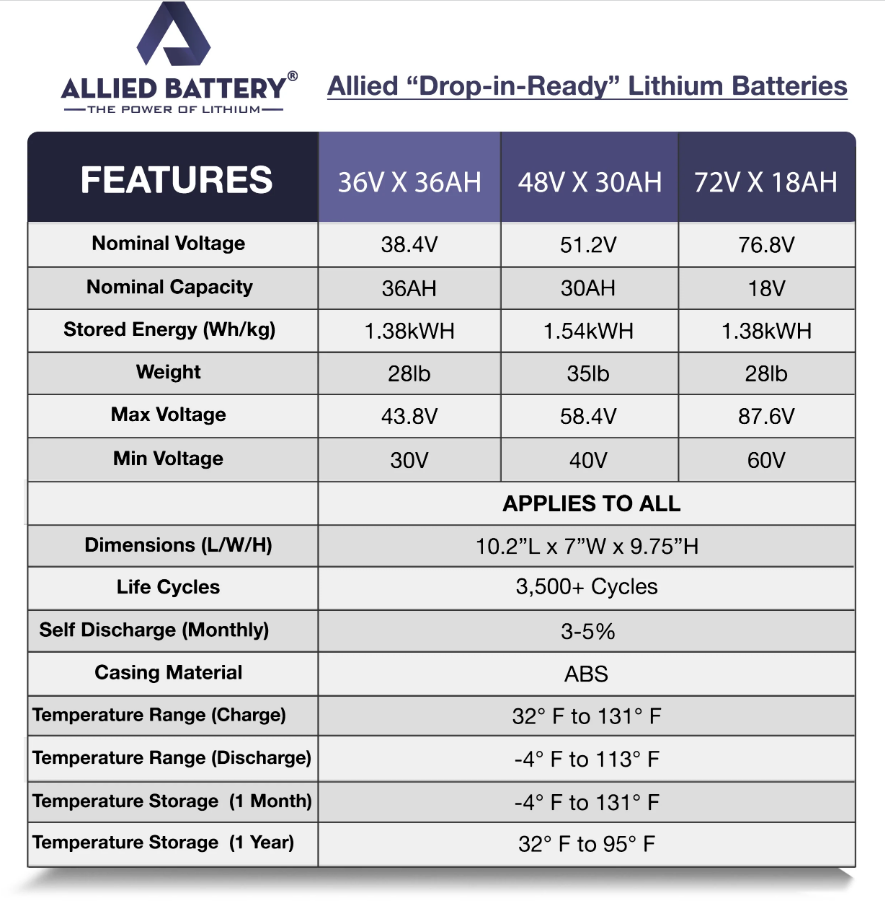
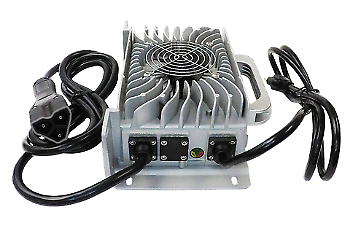
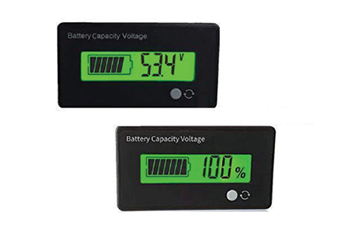
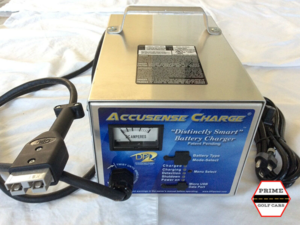 A DPI brand charger with EZGO SB-50 2-pin connector. Designed to be used on any 36 volt golf cart that uses the 2 blade SB-50 connector and charging port.
A DPI brand charger with EZGO SB-50 2-pin connector. Designed to be used on any 36 volt golf cart that uses the 2 blade SB-50 connector and charging port.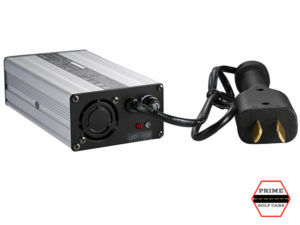 36 Volt charger for EZGO TXT, Club Car DS, and Yamaha golf carts, with crow’s foot connector. This is an automatic charger with a trickle mode that makes sure your batteries are not overcharged, which keeps them running stronger for longer. It is designed to turn off when the voltage reaches a certain level. Charging time is usually between 4-6 hours.
36 Volt charger for EZGO TXT, Club Car DS, and Yamaha golf carts, with crow’s foot connector. This is an automatic charger with a trickle mode that makes sure your batteries are not overcharged, which keeps them running stronger for longer. It is designed to turn off when the voltage reaches a certain level. Charging time is usually between 4-6 hours.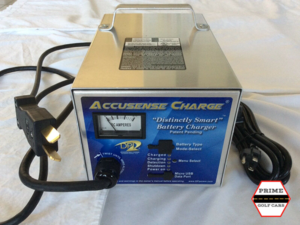 DPI brand 36 volt charger with a crow’s foot connector, for EZGO, Club Car, and Yamaha golf carts.
DPI brand 36 volt charger with a crow’s foot connector, for EZGO, Club Car, and Yamaha golf carts.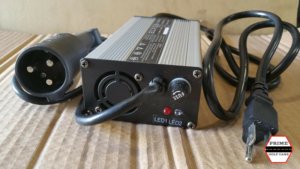 Fully automatic 48 Volt battery charger for Star golf carts. Comes pre-configured with a 48V style connector plug. Operates on standard household power. Made for overnight charging and features a trickle mode. 2 LED lights indicate charging status.
Fully automatic 48 Volt battery charger for Star golf carts. Comes pre-configured with a 48V style connector plug. Operates on standard household power. Made for overnight charging and features a trickle mode. 2 LED lights indicate charging status.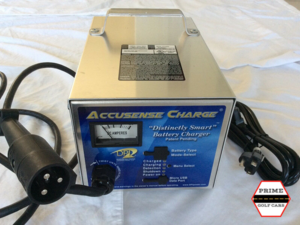 DPI brand 48 volt Star golf cart charger with Star 3-pin connector. Designed to be used on any 48 volt Star golf cart that uses the Star 3-pin connector and charging port. No spark charging; reverse battery protection.
DPI brand 48 volt Star golf cart charger with Star 3-pin connector. Designed to be used on any 48 volt Star golf cart that uses the Star 3-pin connector and charging port. No spark charging; reverse battery protection.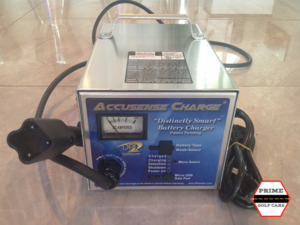 48 volt Yamaha golf cart DPI brand charger for the Yamaha Drive or G29 from 2007 and up. Designed to be used on any 48 volt Yamaha golf cart that uses the Yamaha 3-pin connector and charging port.
48 volt Yamaha golf cart DPI brand charger for the Yamaha Drive or G29 from 2007 and up. Designed to be used on any 48 volt Yamaha golf cart that uses the Yamaha 3-pin connector and charging port.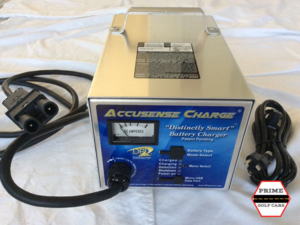 DPI brand 48 volt Yamaha G19 G22 golf cart charger with Yamaha 2-pin connector. Designed to be used on any 48 volt Yamaha golf cart that uses the Yamaha 2-pin connector and charging port.
DPI brand 48 volt Yamaha G19 G22 golf cart charger with Yamaha 2-pin connector. Designed to be used on any 48 volt Yamaha golf cart that uses the Yamaha 2-pin connector and charging port.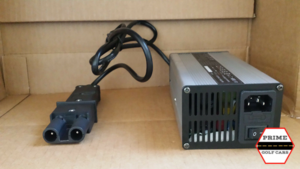 48 volt charger pre-configured with a Yamaha Nabson style connector plug. Made for overnight charging. Includes automatic LED charging status lights.
48 volt charger pre-configured with a Yamaha Nabson style connector plug. Made for overnight charging. Includes automatic LED charging status lights.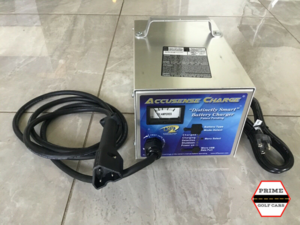 48 volt DPI brand charger for EZGO TXT RXV golf carts. Designed to be used on any 48 volt EZGO TXT golf cart that uses the EZGO 3-Pin Connector and charging port.
48 volt DPI brand charger for EZGO TXT RXV golf carts. Designed to be used on any 48 volt EZGO TXT golf cart that uses the EZGO 3-Pin Connector and charging port.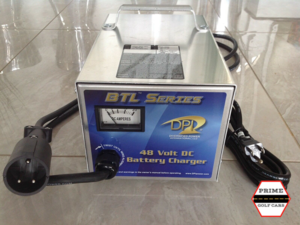 New DPI brand 48 volt Club Car DS/Club Car Precedent golf cart charger. Works with 1996 or newer models. Factory sealed box.
New DPI brand 48 volt Club Car DS/Club Car Precedent golf cart charger. Works with 1996 or newer models. Factory sealed box.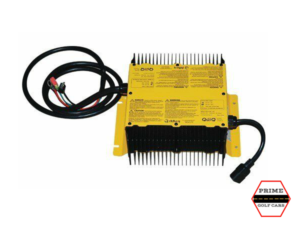 Delta Q QuiQ On-board 48 volt battery charger for golf carts with wet or sealed batteries. Completely sealed, the Delta Q golf cart charger is passively cooled without the use of fans, and can store up to user-selectable charge algorithms.
Delta Q QuiQ On-board 48 volt battery charger for golf carts with wet or sealed batteries. Completely sealed, the Delta Q golf cart charger is passively cooled without the use of fans, and can store up to user-selectable charge algorithms.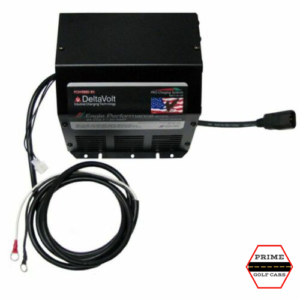 For any heavy duty 48 volt system, the Eagle is set up to charge efficiently and reliably every time. The charger has an integrated microprocessor to prevent overcharging the battery system, turning off completely once the batteries are fully charged. If batteries drop below a programmed voltage amount, the Eagle charger automatically reactivates to bring the batteries back to 100%, and can also adjust using an algorithm to compensate for temperature.
For any heavy duty 48 volt system, the Eagle is set up to charge efficiently and reliably every time. The charger has an integrated microprocessor to prevent overcharging the battery system, turning off completely once the batteries are fully charged. If batteries drop below a programmed voltage amount, the Eagle charger automatically reactivates to bring the batteries back to 100%, and can also adjust using an algorithm to compensate for temperature.